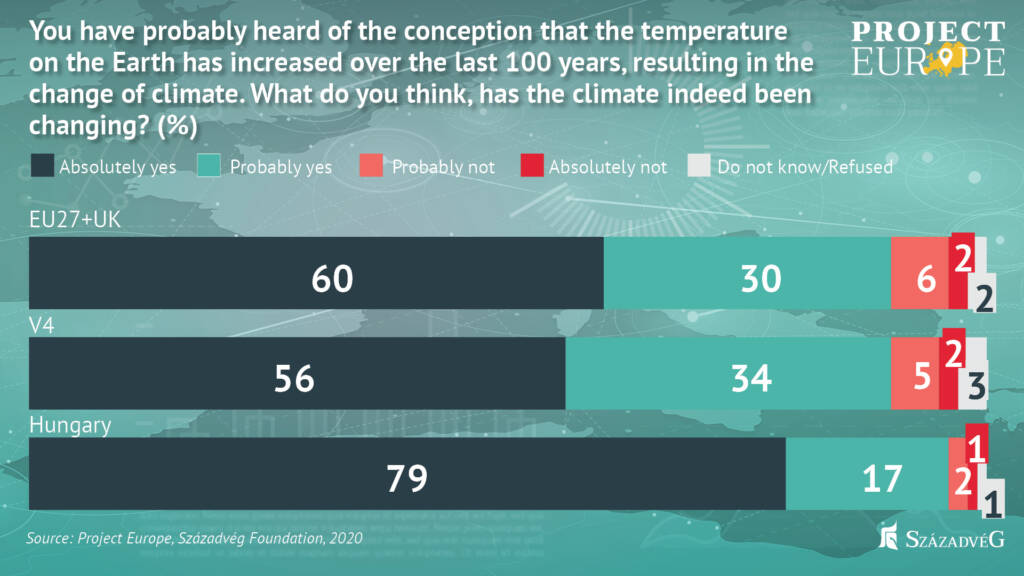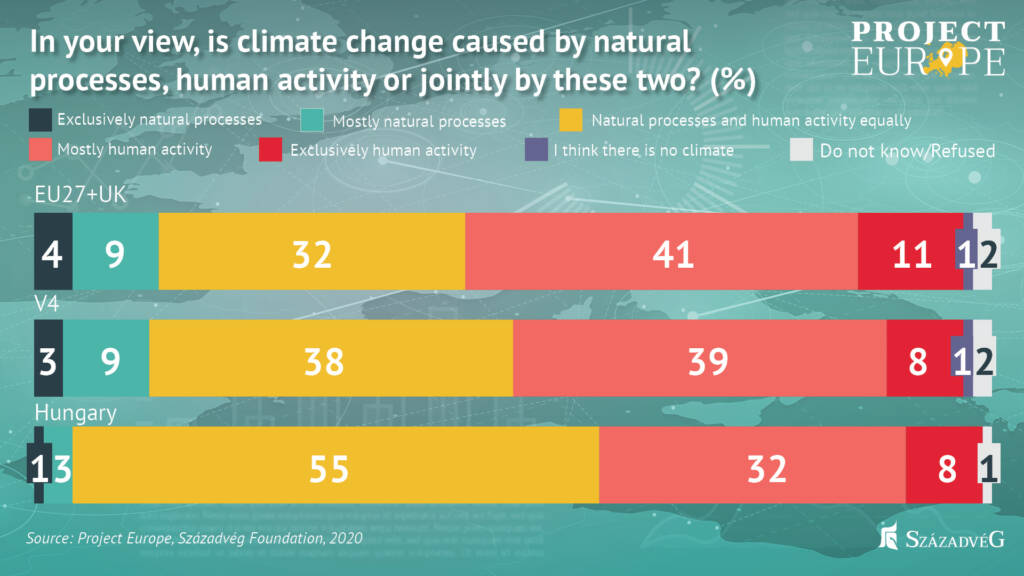This article has been published by Századvég on December 11, 2020.
In recent years, the role of climate change issue in European politics and public discourse has grown significantly. Excessive sensitization and political polarization are directing an increasing mass of people towards two extremes – the denial of climate change and the fear of the consequences of the phenomenon. This week [mid-December 2020, Ed.], the European Council is going to discuss to raise the Community’s 2030 greenhouse gas emissions target, making the issue extremely topical. Based on its Project Europe research, Századvég examined the attitudes of people in the 27 Member States of the European Union and the United Kingdom towards climate change. Based on the results, Hungarians are the least susceptible to extremism among the examined countries.
Over the next decade, all EU Member States are expected to increase their climate protection efforts, which will place a significant additional burden on both people and governments. Similar to the handling of the coronavirus pandemic, where the biggest challenge is to balance health and economic goals, policymakers also face a difficult dilemma when planning climate policy. A future path must be set for the European Union in which the community can develop and (at least) keep its global economic power, so that it can devote sufficient resources to conserving nature and maintaining the living standards of future generations.
In Europe, climate change has gradually begun to seep from its former policy position into big politics, posing a serious risk to sensible and professional decisions. Communication of a political nature based on people’s fear and mobilizing with apocalyptic visions leads to an irrational degree of anxiety and overly emotionally driven, individual decisions, which may easily divert people from environmentally rational actions. As an extreme reaction to the phenomenon, the denial of the climate change phenomenon appears, reducing the acceptance of environmental policy efforts. The research examined the emergence of two extremes – climate scepticism and extreme fear of climate change – in the European Union and the United Kingdom.
Hungary has one of the lowest rates of climate change denials
Two types of mistrust can be identified in relation to climate change, the representatives of which are mostly equally described as climate sceptics by the public discourse. On the one hand, a group of people deny the phenomenon of climate change, that is, the recent rise in global average temperatures; this is also called trend scepticism. In the case of attribution scepticism, another extreme position arises, which is also scientifically questionable: There are those who think that climate change is solely the result of human activity, on which natural processes have no effect at all.
According to the survey, the number of trend sceptics across Europe is very low. The proportion of European respondents who say the climate is unlikely or clearly not changing is a total of 8 percent. A common argument against the Visegrad countries is that their more cautious climate policy is due to a large proportion of climate change sceptics. The results of the research do not support this claim: the proportion of sceptics exceeds the EU average only in the Czech Republic of the four countries by 1 percent, while the other three countries have lower rates of climate change deniers than other Europeans. The proportion of the respondents who identify climate change as unambiguous is the highest among Maltese and Portuguese respondents (97 percent each) and Hungarians (96 percent).
Like trend scepticism, attribution scepticism is not typical of the European community either. Only 4 percent of European respondents believe that climate change is solely the result of natural processes and only 1 percent deny the phenomenon. The proportion of those who identify climate problems solely as the result of human activities is higher: 11 percent. Overall, the Visegrad countries have lower rates of both extremes: only 3 and 8 percent (only the 15 percent response rate of exclusive human activities in Slovakia exceeds the European average). The proportion of those who say that only natural processes cause climate change is the lowest, only 1 percent in Hungary, with the same statistics in Malta and Portugal. The proportion of those who identify climate change solely as a result of human activities is 8 percent, which places Hungary in the lower third of the EU.
Based on the results of attribution scepticism, the “price” of the low rate of climate change deniers in several countries is that more and more opinions are shifting to another extreme category that overestimates the impact of human activity. This in itself is not a problem, as it does not pose a risk to the acceptance of environmental policy measures, but it has the potential to amplify people’s negative feelings about the effects of their own actions and society as a whole, leading to general dissatisfaction and excessive fear.
Hungarians have a pragmatic attitude to climate change
In the face of the climate change phenomenon and the proportion of human and natural contributions, science does not provide accurate and reliable predictions of the expected effects of climate change. Thus, people can only form an opinion on the basis of contradictory, often difficult-to-grasp information. Negative information affecting emotions and raising attention spreads more easily in the media, thus a higher proportion of consumers face such news. With climate change at the forefront of major European politics, political forces and influencers have emerged that, generating a tendency, are trying to whip up people’s fear and radicalize those who have become emotionally vulnerable according to their own narrative.
The results of the research show that half of Europeans are extremely or very much afraid of climate change, which is a very high rate. The proportion of those who are not afraid of climate change is only 17 percent. The emergence of extreme fear is lower in all the Visegrad countries. In Hungary, the level of fear is lower than the average (35 percent). Hungarians think pragmatically about climate change. This is well illustrated by the fact that almost half of Hungarian respondents (45 percent) expressed a moderate opinion on climate change.
An important result of the research is that an inverse relationship can be identified between the proportion of climate change deniers and the level of fear. Fear of climate change is most extreme in countries (Portugal, Malta, Cyprus, Romania) with the lowest numbers of climate sceptics, that is, with political polarization, countries seem to be shifting towards one extreme or the other. Hungary is the strongest exception to the observation, because the proportion of the country’s sceptics is low without the fear of the phenomenon becoming typical. For now, in the European Union, Hungarians are the most resilient to political sensitization and overreactions to climate change.
The Project Europe research
In the first half of 2016, the Századvég Foundation conducted a public opinion poll survey covering all 28 European Union Member States, with the aim to analyse the opinions of EU citizens regarding the issues that most affect the future of the EU. In a unique way, Project28 conducted the widest possible survey of 1,000, that is a total of 28,000 randomly selected adults in each country. Gaining an understanding of society’s sense of prosperity and mapping the population’s attitudes towards the performance of the European Union, the migration crisis and the increasing terrorism were among the most important goals of the analysis. The Századvég Foundation, on behalf of the Hungarian Government, conducted the research again in 2017, 2018 and 2019, which continued to reflect on the topics that most determined the European political and social discourse.
In 2020, the survey, now called the Project Europe, will continue, with the aim of mapping the population’s attitude towards the most important public issues affecting our continent. In addition to society’s sense of prosperity, the performance of the European Union and the attitudes towards the migration crisis, in line with the latest challenges affecting Europe, the dominant theme of this year’s poll is the coronavirus pandemic, climate change and anti-Semitism. In addition to the European Union Member States, the 2020 research covered the United Kingdom, Norway and Switzerland, interviewing a total of 30,000 randomly selected adults using the CATI method.






